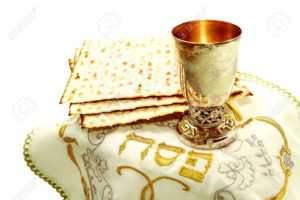 “Can you buy crackers,” my daughter asks.
“Can you buy crackers,” my daughter asks.
“Sure,” I answer. “After Passover.”
“But that’s in like three weeks,” she moans.
“Yes,” I reply. “You will survive.”
“Do we have any cookies?” she asks.
“They’re finished.”
“And you’re not buying more until after Passover?”
“Exactly.”
Some version of this conversation occurs in my house every year after the hamentaschen have been eaten and the mishloach manot baskets dismantled. In an effort to rid my pantry, fridge and freezer of all manner of hametz, I refuse to buy grocery items I do not plan to use immediately, and I do not restock the staples as they are finished.
I take great pleasure in creatively cooking myself out of hametz. It’s kind of like a personal game of Chopped. As I plan meals for the last few weeks, I negotiate between recipes and what’s left in my pantry, and a successful meal is determined by how many boxes, cans, jars or bags I can empty in the process.
My family pretends they are suffering – with s’more cookie bars (which finished the jar of marshmallow fluff and a bag of chocolate chips), and grilled chicken (that used up the last of the maple syrup, teriyaki sauce and the dijon mustard), and pickled brisket (which finished the brown sugar, ketchup and the honey-mustard). But their complaints fall on deaf ears.
Here, in the kitchen, is where I start to feel a connection to the many messages and lessons of the holiday, amidst the onerous preparations. As the pantry becomes barer and the fridge emptier, I am inspired by the sparseness – by our ability to live simply and still eat well, to prepare delicious meals with only a minimum of ingredients, and by eliminating frequent trips to the grocery store for that one missing item (and anything else I see along the way).
And by making do with only one kind of mustard.
This Shabbat we will read in the Torah from the book of Exodus for the first day of Passover. This section of text contains all the basic requirements of the holiday – the command to remember what God did for the Israelites, to celebrate for seven days, to eat matzah and to remove all leavened bread from our houses. The most important element to me, however, is the story we tell our children.
And when your children ask you, ‘What does this service mean to you?’ You shall say, ’It is the Passover sacrifice to the Lord, because He passed over the houses of the Israelites in Egypt when He smote the Egyptians, but saved our houses.’
In the Haggadah, this is the question attributed to the “wicked” son as evidence of his alienation from the community. He asks what does this mean to you, thereby excluding himself from participating in the commemoration of the Exodus and the communal faith in God’s miracles. Many contemporary haggadot and commentaries question whether wicked is really the right adjective to describe this personality – perhaps rebellious or arrogant is more apt?
But the question on its own is an important one. When your child asks what does this mean to you, they are looking for direction and for a context in which to understand the rituals and customs and even our own personal shtick.
Like refusing to buy crackers or cookies.
While the word Seder means order, as Passover approaches my brain feels like a bulletin board overflowing with post-it notes. The cleaning and organizing, the endless lists and menu plans, and the shopping and cooking are only followed by late Seder nights, piles of dishes and cranky children off their regular schedule.
What does this service mean to you? At moments, more like enslavement than freedom…
But the children are bubbling with excitement. They can’t wait to eat the matzah, they beg to taste the charoset, they argue over who can help with the matzah balls, and they decorate the table with place cards and finger puppet plagues. They are eager to show what they’ve learned, and the guests around the table are keen to listen and receive what they’ve brought home from school.
When I think about the question What does this service mean to you? I want to be sure exhaustion and enslavement are not the only lessons they learn from me. And it is not easy in the midst of the frenzy of cleaning and shopping and cooking to be mindful of the girls who are watching me carefully (and whom I hope will one day take over for me).
So when my children ask why – why won’t I buy crackers, why I do relish the opportunity to empty out the kitchen, why is this part of my Passover ritual – I explain that creatively cooking myself out of hametz manifests all we have to be grateful for – not only the food we get to buy and eat all year-round, but the opportunity to start anew, to re-evaluate how we eat and how we spend, to test our ability to do with less rather than more.
What does this service mean to you? Only true freedom allows us this chance to begin again, to make different decisions, and to be creative.
In the kitchen and in life.
I wish you all a chag kasher ve-sameach, a happy and healthy Passover, and meaningful Seders filled with lively discussions, good food and the warmth of family and friends.
Shabbat Shalom.











